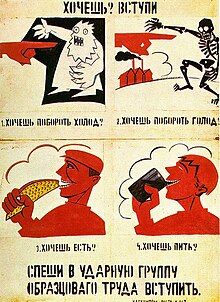Udarnik: Difference between revisions
m →In Poland: minor |
"in the ex-Yugoslavia" implies that the term is in current use |
||
| Line 3: | Line 3: | ||
{{for|the Yugoslavian glider|Udarnik (glider)}} |
{{for|the Yugoslavian glider|Udarnik (glider)}} |
||
[[Image:Plakat mayakowski gross.jpg|right|thumb|right|[[Agitprop]] poster by [[Vladimir Mayakovsky]]: "Hurry to join shock brigades!"]] |
[[Image:Plakat mayakowski gross.jpg|right|thumb|right|[[Agitprop]] poster by [[Vladimir Mayakovsky]]: "Hurry to join shock brigades!"]] |
||
'''Udarnik''' ({{lang-ru|''Ударник''}}) is a [[Russian language|Russian]], [[Bosnian language|Bosnian]], [[Croatian language|Croatian]] and [[Serbian language|Serbian]] term for a superproductive worker in the [[Soviet Union]] and [[ |
'''Udarnik''' ({{lang-ru|''Ударник''}}) is a [[Russian language|Russian]], [[Bosnian language|Bosnian]], [[Croatian language|Croatian]] and [[Serbian language|Serbian]] term for a superproductive worker in the [[Soviet Union]] and [[Comecon|its satelites]]. The term is derived from the expression "udarny trud" for "superproductive, enthusiastic labour", which is often translated as '''strike labour''' (''udar'' "shock, strike, blow"), and ''udarnik'' as '''strike worker''', respectively.{{Citation needed|date=February 2011}} |
||
Related terms are "Shock labour team" (''udarnaya brigada'', often translated as '''strike brigade''') and "Udarnik of Communist Labour" (''Ударник коммунистического труда''), a Soviet [[title of honor|honorary title]]. This is in contrast to the phrase [[shock troops]], which is a translation from a [[German language|German]] term. |
Related terms are "Shock labour team" (''udarnaya brigada'', often translated as '''strike brigade''') and "Udarnik of Communist Labour" (''Ударник коммунистического труда''), a Soviet [[title of honor|honorary title]]. This is in contrast to the phrase [[shock troops]], which is a translation from a [[German language|German]] term. |
||
Revision as of 18:59, 8 May 2012
The examples and perspective in this article may not represent a worldwide view of the subject. (July 2007) |

Udarnik ([Ударник] Error: {{Lang-xx}}: text has italic markup (help)) is a Russian, Bosnian, Croatian and Serbian term for a superproductive worker in the Soviet Union and its satelites. The term is derived from the expression "udarny trud" for "superproductive, enthusiastic labour", which is often translated as strike labour (udar "shock, strike, blow"), and udarnik as strike worker, respectively.[citation needed]
Related terms are "Shock labour team" (udarnaya brigada, often translated as strike brigade) and "Udarnik of Communist Labour" (Ударник коммунистического труда), a Soviet honorary title. This is in contrast to the phrase shock troops, which is a translation from a German term.
This terminology is also seen in texts related to work in other Communist states, most notably in the People's Republic of China, North Korea, People's Republic of Bulgaria and Socialist Federal Republic of Yugoslavia.
In Poland
In People's Republic of Poland the corresponding title was przodownik pracy (the leader of workship, also can be understood as the teacher of [good] work). Most people familiar with this term understood it as the one who introduces superproduction, mainly based on the story of Wincenty Pstrowski, a miner who once achieved 270 percent of expected efficiency per month. Later Pstrowski died due to misconducted dental intervention, but in popular opinion it was due to deadly exhaustion.
